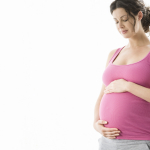Over the last decade, various studies have examined the risk of obstetric complications in women using antidepressants during pregnancy.
Preeclampsia: Some studies have suggested that pregnant women taking SSRI antidepressants may be at higher risk for gestational hypertension and, particularly, preeclampsia. However, other studies have shown a link between depression and anxiety and risk for preeclampsia, and it has been suggested that both conditions may trigger the pathogenic vascular processes that lead to gestational hypertension (by inducing vasoconstriction and uterine artery resistance). One Finnish study quoted a threefold risk for preeclampsia among women with depression and anxiety. So is it the antidepressant that increases risk for preeclampsia, or is it the underlying illness for which the antidepressant is used to treat?
Postpartum Hemorrhage: Other studies have shown that serotonin reuptake inhibitor (SRI) antidepressants, which affect platelet aggregation and thus may increase the risk of bleeding, may be associated with an increased risk of postpartum hemorrhage when used during pregnancy. However, other studies indicate that non-serotonergic antidepressants also increase risk for postpartum hemorrhage, suggesting that other factors may contribute to this risk.
A new study analyzing a large medical claims database attempts to examine the association between exposure to antidepressants and these obstetric complications while controlling for potential confounding factors, including underlying psychiatric illness.
In this retrospective cohort study, researchers utilized data from the OptumLabs administrative health care claims database (2012-2016) to identify singleton liveborn deliveries. Out of 226,932 singleton pregnancies, 15 041 (6.6%) pregnancies were exposed to an antidepressant. Antidepressant dispensing doses were converted to fluoxetine equivalents.
Five trajectory groups were identified among women using antidepressant:
- A: Low exposure, starting pregnancy at ~10 mg/day, with 1st trimester reduction/discontinuation,
- B: Low sustained exposure of ~20 mg/day,
- C: Moderate exposure (~40 mg/day) with 1st trimester reduction/discontinuation,
- D: Moderate sustained exposure of ~40 mg/day,
- E: High sustained exposure of ~75 mg/day.
The low exposure group with dosage reduction/discontinuation in the first trimester (trajectory A) was used as a comparison group. Previous studies have used control groups with no exposure to antidepressant; however, often these control groups have had no history of psychiatric illness, which has made it difficult to parse out the effects of exposure to medication from exposure to the underlying illness. This control group would consist of women with histories of either depression or anxiety disorder who elect to discontinue treatment with antidepressant during pregnancy.
In this low exposure group, the risk for preeclampsia was 8.2% and for postpartum hemorrhage was 2.7%.
Compared to the control group, the risk for preeclampsia was elevated in groups with sustained treatment, with the adjusted relative risk (RR) increasing as the dose increases: low dose RR 1.17, 95% CI 1.01-1.34; moderate dose RR 1.31, 95% CI 1.12-1.54; and high dose RR 1.41, 95% CI 1.05, 1.90). While the increase in risk was statistically significant, the magnitude of the increase was small across all groups.
Similarly there was a small increase in risk for postpartum hemorrhage which was dose dependent: low dose RR 1.32, 95% CI 1.05-1.66; moderate dose RR 1.35, 95% CI 1.03- 1.78; high dose RR 2.51, 95% CI 1.69-3.71). \
There was no increased risk for either outcome in women with moderate exposure with reduction/discontinuation (trajectory C).
While this study indicates that women with sustained antidepressant exposure during pregnancy, especially at higher doses, were at increased risk for preeclampsia and postpartum hemorrhage, but we cannot rule out the possibility that underlying depression and anxiety may contribute to the increased risk. While the women in the control group have histories of depression and/or anxiety, it is likely that women who elect to discontinue medication may have milder illness than women who decide to maintain treatment.
Does This Information Affect Our Recommendations?
Not really. Overall the increase in risk is small, especially for preeclampsia. If a woman needs to be on an antidepressant to limit her risk of recurrent illness, we generally recommend that she continue on that medication at an effective dosage.
Ruta Nonacs, MD PhD
Palmsten K, Chambers CD, Wells A, Bandoli G. Patterns of prenatal antidepressant exposure and risk of preeclampsia and postpartum haemorrhage. Paediatr Perinat Epidemiol. 2020 Mar 24.








Leave A Comment